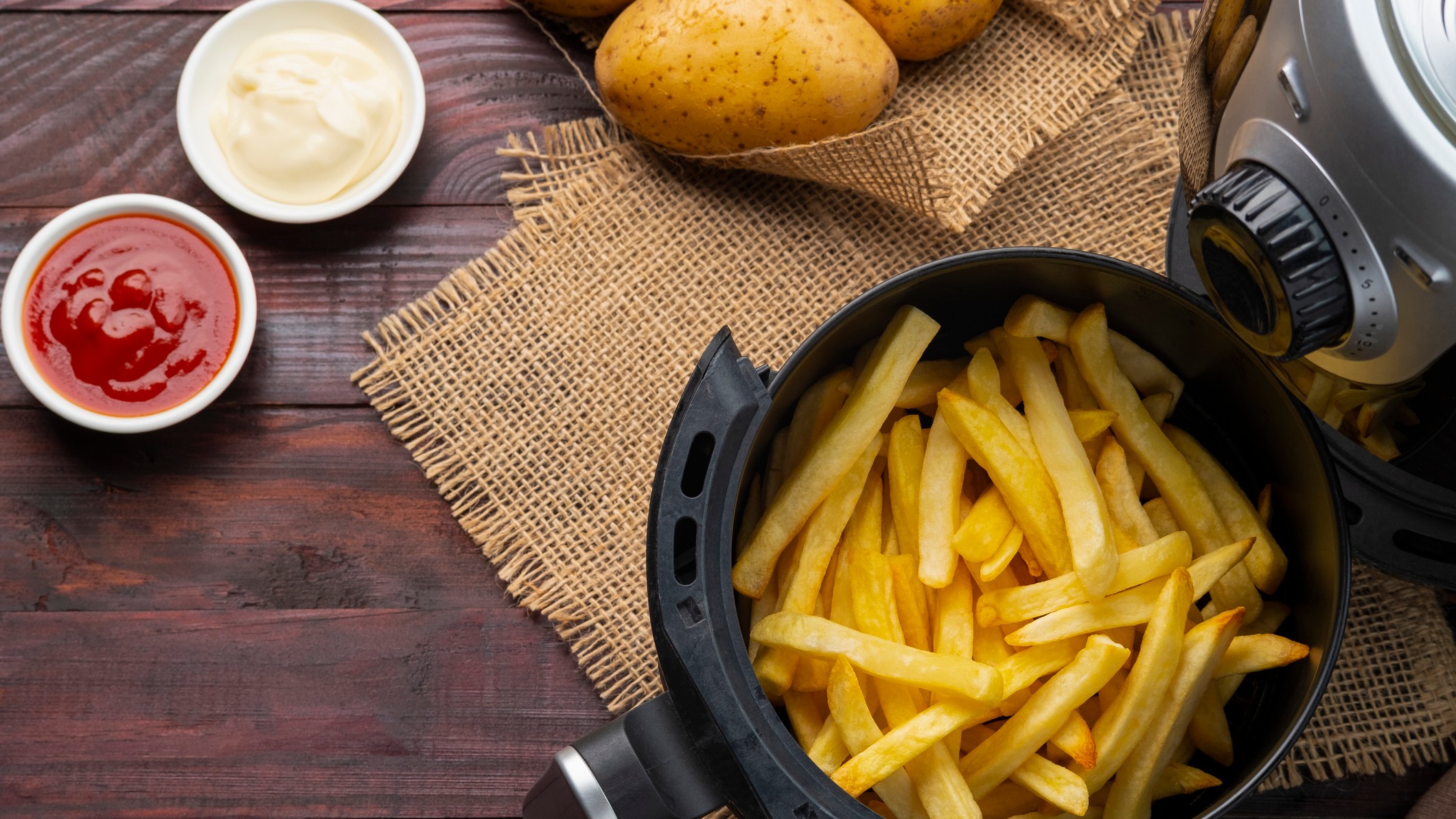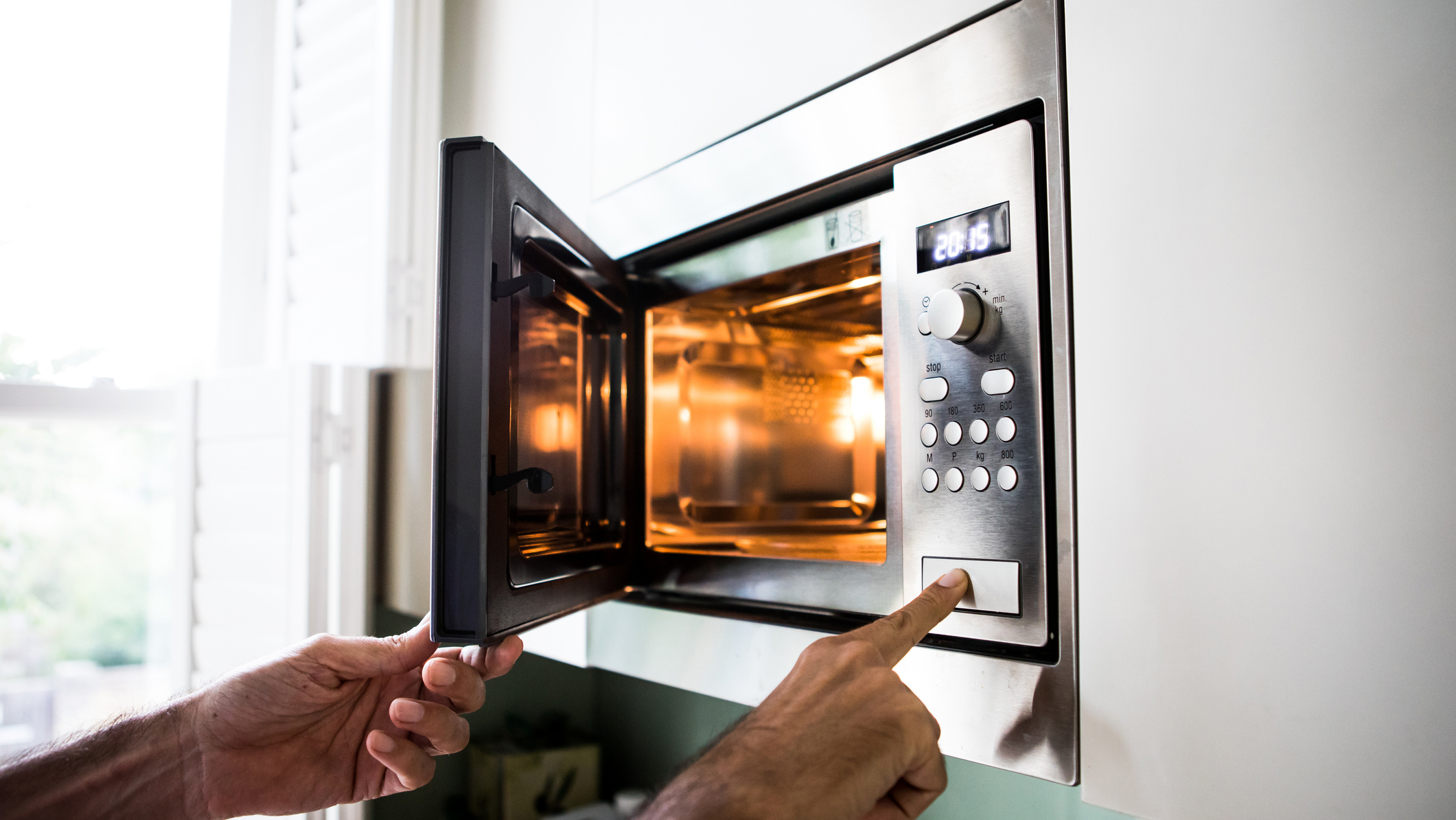Air fryer vs microwave – what are the differences, and which is cheaper to run?
If you're debating an air fryer vs a microwave, according to experts this is when you should use one over the other

Air fryer vs microwave – given that energy prices are high and rising steeply, you might be considering whether one of these appliances might be a more cost-effective way of cooking and if it’s worth using one over the other to prepare your daily meals.
Though they both heat up our food, an air fryer, and a microwave are two fairly different types of appliances. Unlike air fryers and ovens, they work in different ways to heat up our food, and as such, have largely different purposes, and produce pretty different outcomes.
That said, there are some similarities between the two, and knowing when it might be beneficial to use one of the best air fryers over a microwave, or vice versa, can be helpful – both when it comes to saving money, and the result you want when you're cooking.
We spoke to chefs and appliance experts, in order to fully explore the air fryer vs microwave debate and to break down the pros and cons of each appliance.
Air fryer vs microwave: how do they both work?
As mentioned, air fryers and microwaves work in different ways – while comparing air fryers vs ovens, for example, the two are very similar in function, the same is not true for a microwave and an air fryer.
AO.com’s small appliance expert, Thea Whyte, explains to us, “Microwaves work by vibrating the water molecules inside the food, making them perfect for reheating food – whereas air fryers use convection heating, in which the hot air is distributed throughout the appliance [via a fan] giving food that crispy coating." This is one of the main reasons our expert w&h food team argues air fryers are worth it over all other appliances.
As such, when stacking up an air fryer vs microwave, it’s not necessarily all that beneficial to pit the two appliances against one another.
Sign up to our free daily email for the latest royal and entertainment news, interesting opinion, expert advice on styling and beauty trends, and no-nonsense guides to the health and wellness questions you want answered.
Air fryer vs microwave: pros and cons of both appliances
While an air fryer and a microwave are not so easily comparable, it can be helpful to explore the functions of both, and the benefits and disadvantages that each appliance offers overall.
Benefits of air fryers
- They produce fried food in a healthier way: Wondering whether air fryers are healthy? Yes – they can create that almost deep-fried texture in a healthier way when compared to a deep-fat fryer, or even an oven, given that they are designed to use very little to no oil.
- You get crispiness like no other method: Most of us love our air fryers because of the deliciously tasty, crispy food they produce – be it fries, chicken, or fish. And that’s why one of the main benefits of using an air fryer (vs a microwave) is the food the appliance creates. Thea explains, “The air fryer is ideal for cooking foods at a quicker speed when you want something extra crispy or crunchy, such as chicken and baked potatoes with crispy skins."You simply can’t get this crispy texture from a microwave, unless you are reheating something pre-cooked and even then it has a tendency to be soggy rather than crispy.
- They're more energy efficient than ovens: Air fryers are considered to be one of the most energy-efficient cooking appliances, especially when compared to an oven. It’s estimated that an air fryer will cost about 17p to run for 30 minutes – which is ideal given that most air fryer recipes only require cooking for around 20 minutes on average. However, they aren't necessarily as energy efficient as microwaves, as we'll explain later.
- You can cook a variety of different recipes in them – from scratch: When it comes to what you can cook in an air fryer, there are lots of options. While a microwave is best at reheating food, and can only cook a limited number of recipes from scratch, an air fryer can help you to cook a variety of tasty foods from their raw state, including things like shrimp, omelets, and baked goods, like cupcakes. As such, while there are of course some things that you shouldn’t cook in an air fryer, it can be an incredibly useful tool in helping you to prepare fresh meals on a daily basis.

Cons of air fryers:
- They can be slightly awkward to clean: Due to their awkward shape and removable parts, knowing how to clean an air fryer can feel like a daunting task – especially compared to the ease of cleaning a microwave, which can be addressed with a quick wipe-around with a microfiber cloth and anti-bacterial spray. Cleaning expert Mira Yordanova, owner at TopCleaningGB said, “When it comes to cleaning an air fryer, many can find this tricky as food can stick to the grilling plate.” However, it’s not impossible; it will take more time than cleaning a microwave. Mira advised, “Opt for a cleaning solution of baking soda, dish soap, and vinegar followed by some hot water. These products should help to lift the grease.”
- It can be tricky to find a spot for them: If you’re wondering where you should place an air fryer in your kitchen, you’re not alone! Unlike microwaves, which are either pre-installed into kitchen cabinets or can fit neatly into a corner, the rounded shape of an air fryer means they can be difficult to find a place for. Jenny Tschiesche, nutritionist and author of Air-Fryer Cookbook, on behalf of Instant Brands, said, "You are more likely to have to forfeit some surface space for an air fryer." While in use, you’ll also need to ensure that your air fryer isn’t in the way of other appliances and that it isn’t positioned against a wall during use, to mitigate any fire risk.
- You can’t cook everything in them: As mentioned, while it is largely possible to reheat pretty much anything in a microwave, you can’t cook – or reheat – everything in an air fryer. That leftover spaghetti dish? It’ll turn dry and crunchy in your air fryer. Those green veggies you want to accompany dinner tonight? They’ll likely burn. That wet batter? It won’t crisp up enough in an air fryer.
- They use more energy than a microwave: While we’re all aware by now that a microwave and an air fryer perform different functions if you’re debating both appliances on a cost basis, most experts agree that an air fryer will cost you slightly more to run than a microwave.
Benefits of microwaves
- They can heat, or reheat, almost anything – and fast: As mentioned, while air fryer users are discouraged from placing certain foods inside them, microwaves can effectively heat up or reheat most foods without concern (bar a few exceptions). Chef and food expert Lisa Marley said, “A microwave is great for heating and reheating food in a time-efficient way. You can also defrost food too, as well as heat liquids.” Microwaves are also ideal for almost all leftovers; though of course, you need to be sure to fully reheat things like rice and potatoes, to kill any potential bacteria.
- Cheaper to buy and run: Overall, microwaves are far cheaper to purchase than air fryers (though the best air fryer deals can help). And, while debated in the air fryer vs microwave discussion, microwaves tend to cost less to run, too. Lisa explained that “Typically, microwaves are cheaper to run than air fryers. This will depend though on how long you use it for and how powerful the model is.” Plus, most people will run a microwave for less time than an air fryer, so on a like-for-like basis, it’s likely that your microwave will expend less energy, and therefore, cost you less money.
- Generally easier to clean: Many consider microwaves to be easier to clean than air fryers because of their simple, rectangular shape, and the fact that the only removable part can be popped straight into the dishwasher. An air fryer, on the other hand, has more parts that will need to be hand washed and can be trickier to thoroughly clean given their tighter nooks and crannies. Similarly, an air fryer needs to be cleaned ideally after every use – while a microwave can be used at least a couple of times before needing to be cleaned, making its cleaning process much less time-consuming.

- Microwave ovens can help you to cook food in a healthier way: While air fryers provide us with a healthier form of tasty ‘fried’ food, they’re not necessarily *the* healthiest option for cooking. Microwaves on the other hand can help you cook foods like veggies via steaming, which is one of the healthiest methods of food preparation.
- They can perform other tasks: Microwaves are of course there to help you prepare various dishes, but they can also assist you in the kitchen in other ways. You can use your microwave to heat up cold plates or bowls before serving, and you can also disinfect things like kitchen sponges in them too; so long as they don’t have any metallic components.
Cons of microwaves:
- They don’t create crispy food from scratch: Unlike air fryers, microwaves can only really reheat foods, or heat from scratch a very small selection of foods. Lisa explained, “Microwaves don’t cook with heat, so the food you cook won’t brown or crisp." They won’t roast or bake your recipes, and using them certainly won't result in a deliciously golden, crispy dish in same way an air fryer, or even an oven, would.
- The end result isn’t always satisfying: Because microwaves essentially steam your food (via its water molecules), they can sometimes produce a meal that feels a little wet or soggy – which isn’t overly appetizing or satisfying to eat. An air fryer, on the other hand, should never produce soggy food, unless you have placed a food item in there that is too ‘wet’, such as a dish with lots of batter.
- They can be dangerous if you put the wrong things in them: While you can (within reason!) put most things in your air fryer, there are some household/kitchen items that should never be placed in a microwave, at the risk of causing a fire or damaging your appliance. A few things you should never put in a microwave include styrofoam, plastic containers, parchment paper or tin foil – the latter two of which can safely be used in an air fryer.
When would you benefit from using an air fryer or a microwave?
- Air fryers are best for: People who want crispy, tasty, fried food that requires little to no oil, and those who want an appliance that is much less expensive and more energy efficient than an oven (it could even act as an alternative). Air fryers, compared to microwaves, are used to cook food from scratch, and they can offer more space in which to cook a meal if your oven is full.
- Microwaves are best for: Reheating leftovers and cooking certain foods from scratch (such as baked potatoes). A microwave is ideal for people who want to cook recipes in ultra-quick time (especially compared to their hob) be it scrambled eggs or porridge/oatmeal. A microwave can also be used for kitchen tasks that aren’t related to cooking, such as disinfecting sponges and heating up plates or bowls before serving.

Is it cheaper to use an air fryer than a microwave?
Both appliances are fairly energy efficient when compared with lots of other kitchen machines (such as energy-sucking washing machines or ovens), but as mentioned, most experts agree that microwaves tend to be cheaper to run than air fryers.
“The price of running each appliance does depend on the wattage of the appliance [a higher wattage means it is more expensive to run]," Thea explains. "However, as the microwave only needs to run for several minutes in comparison to an air fryer, which will typically be on between 20 and 30 minutes, the microwave will generally be more efficient."
And, in order to make your microwave even more energy efficient than it already is, Thea suggests, “Many microwaves have an LCD time display on standby, so make sure to switch it off at the plug after use to conserve more energy.”
Can an air fryer replace a microwave?
The end result of using these two appliances is very different, which means that an air fryer can’t really take the place of a microwave – and vice versa. Instead, the experts say that you should embrace using both in your kitchen, even in tandem with each other.
“They do have a few similarities, in the fact that they are both energy efficient, easy to use, and compact in size, and they are both affordable compared to conventional ovens,” Lisa said. “That said, one wouldn't be able to replace the other, as the end results are so varied. If space and budget aren't an issue, having both appliances would be beneficial.”

Thea agreed that, because the functions of both are so different, there’s no need to choose between these two appliances. “As both the air fryer and microwave cook food in different ways, we would recommend having both appliances where possible.
"In fact, most people like the microwave for convenience, and the air fryer for flavor,” she said. And it's a great point; you can never replicate the crispy, tasty food an air fryer produces in a microwave – nor can you replicate the ease of reheating most foods speedily in a microwave, in an air fryer.
So if you’re debating an air fryer vs microwave, it’s important to note that because one cannot replace the function of the other, having both in your kitchen is the ideal scenario.
Amy Hunt is an experienced digital journalist specialising in homes, interiors and hobbies. She began her career working as the features assistant at woman&home magazine, before moving over to the digital side of the brand where she eventually became the Lifestyle Editor up until January 2022. Amy won the Digital Journalist of the Year award at the AOP Awards in 2019 for her work on womanandhome.com.

